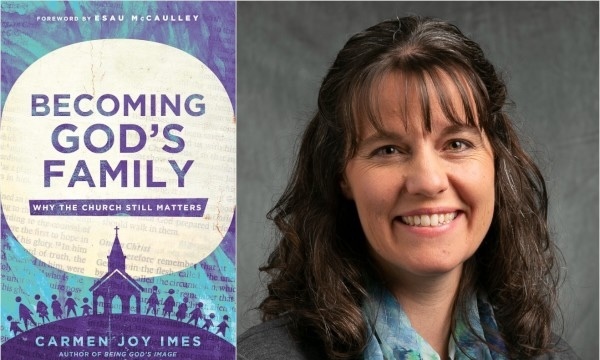When Talbot School of Theology professor Kyle Strobel finished his dissertation on theologian Jonathan Edwards, he knew there was a vast amount of Edwards’s work that would never reach most people. So, Strobel set out to develop a sequence of books to help readers digest some of Edwards’s theology, which according to Strobel, will often surprise you. His most recent book in the series, Jonathan Edwards: An Introduction to His Thought, was co-authored with Fuller Seminary professor Oliver Crisp and released earlier this year.
“This latest project tries to fill a gap in the literature by offering an account of Edwards’s thought for seminary-level readers,” said Strobel. “This book tries to give an account of Edwards’s thought that doesn’t apologize for his idiosyncrasies or even some of his more radical notions, but presents them as he understood them, and then tries to help us understand what to do about that.”
Edwards, an influential eighteenth-century revivalist preacher, has been recognized as one of the preeminent thinkers in the early Enlightenment and a major figure in the history of American Christianity. The book, written to be a student-friendly intro to Edwards’s theology, is one of four Strobel has developed on Edwards. He edited a new edition of Edwards’s Charity and Its Fruits: Living in the Light of God’s Love, wrote Formed for the Glory of God: Learning from the Spiritual Practices of Jonathan Edwards (IVP) that gives an account of Edwards’s understanding of spiritual formation, and published his dissertation focused on how Edwards’s theological system hangs together, Jonathan Edwards’s Theology: A Reinterpretation.
Jonathan Edwards: An Introduction to His Thought tries to fill a gap in the literature by surveying key theological and philosophical themes in his thought, including his doctrine of the Trinity, his philosophical theology of God and creation, and his understanding of the atonement and salvation. One of Strobel’s new areas of research presented in the book is Edwards’s doctrine of the atonement. He was surprised by the two main realities that govern Edwards’s doctrine — wisdom and the love of God.
“Edwards’s view of the atonement is built upon and governed by these two notions, and it reveals the incredible biblical depth of what Christ accomplished in his life, death, resurrection, and ascension,” said Strobel. “Scripture points us to the eternal depths of Christ’s ministry, and so Edwards keeps these things in view as he considers the atoning work of Christ…where the love and wisdom of God serve as the theological foundation upon which Edwards constructs his atonement doctrine.”
Strobel hopes others will discover the depths to which Edwards is such a surprising and important figure for the church to pay attention to today and is pleased with the attention Edwards has received recently.
“The twentieth-century battle over Edwards’s place among the theologians has been won: he is now regarded as a theologian worth studying alongside Athanasius, Anselm, Aquinas, Luther, Calvin, Schleiermacher, or Barth,” writes Crisp in the introduction to their book.
Strobel is an associate professor of spiritual theology and formation at Biola’s Talbot School of Theology. He is an Edwards scholar who writes in the area of systematic theology, spiritual formation, and, quite often, on various aspects of Edwards’s theology.
Jonathan Edwards: An Introduction to His Thought is available for purchase on Amazon.
Learn more about Talbot School of Theology’s Spiritual Formation and Soul Care program.
Written by Jenna Loumagne, manager of media relations. For more information, contact Jenna at (562) 777-4061 or jenna.loumagne@biola.edu.
 Biola University
Biola University
.jpg)

